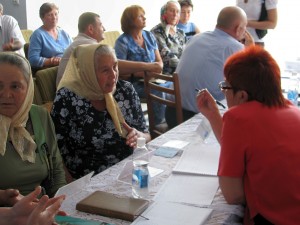A new decentralization policy in Moldova has explicitly addressed the needs of women
Date:

Following two years of public debate and consultation, the President of the Republic of Moldova has signed into law a strategy to decentralize services and decision-making to its local public administrations, making them more accessible to Moldovans.
The consultation process has marked a change in the government's approach to women and other sidelined groups, by for the first time, explicitly ensuring that their needs will be met in a national policy.
While developing the strategy, the government of Moldova received advisory, technical and capacity development support from a Joint UNDP and UN Women programme, funded by the government of Sweden. Strong efforts were therefore made to mainstream gender into the drafting and reform process, with guidance from the Convention on the Elimination of Discrimination Against Women (CEDAW) and other global women's rights treaties.
Local statistical data was collected and organized by gender and vulnerability criteria. Consultations addressed the way that policies and plans could impact vulnerable groups, such as women facing multiple forms of discrimination, including ethnic and religious minorities, and older women. Outreach activities ensured that these groups were involved and informed about the strategy and its consultation opportunities.
As a result Moldovan women from all sectors were involved in articulating the law's goals, principles and objectives.
“This part of the reform agenda is a positive step towards combating the direct and indirect discrimination against women at the local level, said Anastasia Divinskaya, a UN Women Programme Specialist in Moldova. “It shows the commitment of the government to democracy, equality and human rights.
Sectorial ministries will now work to identify responsibilities and resources, which will be devolved to local authorities according to the goals set. It is expected that this will give more autonomy to local authorities, improve accountability among elected officials and empower people in Moldova to strive for better living conditions by encouraging their participation.
For women, who are often less represented at the higher levels of public life, this means that they can more easily contribute to the design of general urban plans, local development plans and budgets, for example. Female members of local community committees will be able to influence spending priorities in the annual budget exercise, whether on sewerage or school construction in their communities.